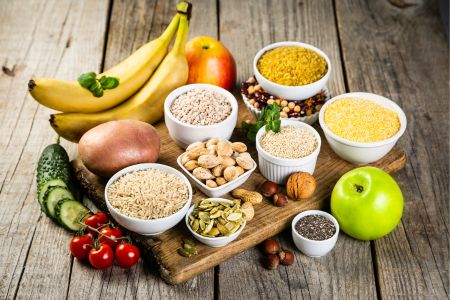
Did you know that the bladder is integral to the overall health of your body and your urinary system? A healthy, fully-functioning bladder stores urine waste produced by the kidneys as your body filters toxins and eliminates excess water. Then it continues to expand to hold your urine until it’s time to use the restroom. This process keeps toxins from building up within your body, which works to keep you healthy.
However, you have to do your part so your bladder can stay healthy and do its job. Additionally, it’s a good idea to avoid the foods and drinks that may irritate your bladder.
The Top 5 Diet Tips for a Healthy Bladder
Ready to find out how you can make easy lifestyle changes that may help improve your bladder’s health?
1. Up your intake of fresh fruits and vegetables.
First, let’s talk about fruits and veggies. Not only are fresh fruits and vegetables great for your body, but they may also have a positive impact on bladder health.
For example, low-acid fruits like apricots, papaya, and watermelon have antioxidants that can help fight off disease or illness. Vegetables can also pack a powerful punch of vitamins and minerals that are necessary for overall health, such as proper organ and hormone function.
Cranberries, cranberry juice, or cranberry supplements can be a great addition to your diet as well, especially if you suffer from frequent UTIs (urinary tract infections). However, keep in mind that cranberries may not be for everyone. Some people may find it causes bladder irritation.
One easy way to get more fruits in your diet is to mix them with yogurt. Many women may already know that yogurt consumption may fight off yeast infections. However, many people don’t realize that eating yogurt can also play a positive role in your bladder’s health too. Yogurt has active bacteria known as probiotics that your body needs. Studies show that eating yogurt may even reduce the risk of developing bladder cancer by keeping the cells of your bladder healthy.

2. Drink the right amount of water to stay hydrated.
Everyone’s bodies and individual needs are different, although experts agree that water is an essential part of everyone’s daily diet. Water helps keep you hydrated. In addition, it can help flush out bacteria and toxins from your system.
However, too much water is not always a good thing. Talk to your healthcare professional about how much water you should drink based on your body type and medical condition.
3. Take in the proper amount of fiber daily.
Foods that are high in fiber may not have a direct impact on the health of your bladder, but they can help fight constipation off, among other benefits of proper fiber intake.
When you’re constipated, your intestines can put more pressure against the bladder, which can cause sensations of being overly full and needing to urinate more often.
Try some fiber-rich foods like leafy greens, beans and lentils, fruits, vegetables, and even whole grains like pasta, bread, oats, rice, and cereals (depending on your dietary allergies and needs). This can help make a positive impact on your digestive health as well.
Did you know that foods high in fiber may also help with weight loss? Being overweight or obese can sometimes be the source of stress incontinence issues. See your doctor for proper medical advice about what steps to take in order to lose weight and reduce your risk of urinary incontinence.
4. Avoid potential bladder irritants in your diet.
Just as it’s important to eat the right things, it’s just as important to avoid eating certain things that can potentially irritate your bladder or even act as a diuretic, which flushes water from your system and can dehydrate you.
If you’re prone to bladder infections and UTIs, you may want to avoid eating much sugar outside of the natural sugars in certain fruits.
Caffeine is a common bladder irritant. Unfortunately, it’s also a very common part of many people’s diets. If you experience issues like urinary urgency, frequency, incontinence, or bladder pain, you may want to cut down your consumption of caffeinated foods like coffee, tea, and soda. Herbal teas or kava may be a good substitute. Talk to your doctor about which foods to consider cutting from your diet.
Acidic and spicy foods may also negatively impact bladder health. The Johns Hopkins Women’s Center provides a helpful list of common bladder irritants that you may want to avoid.
However, you should talk to your doctor about whether you need to avoid certain foods or drinks based on your own unique anatomy.
5. Get the right amount of protein in your diet.
Protein is an essential element in maintaining your muscles and hormone regulation, and this applies to your pelvic and bladder muscles too. Eating a diet with enough protein for your individual needs helps your body’s muscles and organs maintain themselves.
Some foods that are high in protein include legumes, meats, peanut butter, and fish. Your doctor may also suggest a protein shake as a supplement if needed.
As with most other dietary considerations, moderation and watching out for food allergies are the main keys to keeping yourself and your bladder healthy and functioning as best it can.
Where to Find Insurance-Covered Catheters and Incontinence Supplies
If you’ve been prescribed intermittent catheters or incontinence supplies as part of your bladder management program, 180 Medical is here for you.
Just contact us or give us a call at 1-877-688-2729 to talk to one of our friendly experts. We’re ready to provide the supplies you need.
Disclaimer: This blog should not be used in place of medical or professional nutritionist’s advice. Please consult with your physician or other treating healthcare professional to discuss what you may or may not want to include in your diet, based on your individual needs and concerns.
